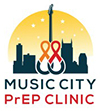Hepatitis A Diagnosis on the rise in Davidson County: Street Works is positioned to combat the Increase
Street Works, a non-profit providing education, prevention and care to those affected by HIV/AIDS in Nashville, is well positioned to help combat the rising number of Hepatitis A cases, said Sharon W. Hurt, executive director. Last week, Nashville Metro Health Department reported 18 cases of Hepatitis A since December 2017.
Hepatitis A is generally spread from person-to-person primarily among people who are homeless and/or users of illicit drugs. According to the Center for Disease Control and Prevention (CDC), those at greatest risk of exposure in the current outbreak include:
- Illicit drug users
- Men engaging in same-sex situations
- And people who are living in a state of homelessness
“Over the past few years, we have seen a significant increase in illicit drug use, particularly opioid use,” Hurt said. “Our unique programming and services helps reduce the exposures by treating and educating those at risk.”
Street Works launched the first state-approved syringe exchange program in February 2017. The program allows users to swap used syringes for clean ones at no cost. Within the first month, some 1,500 used syringes were taken off the street significantly reducing the risk of contamination.
“Our first approach is to recommend users for treatment. Though, we realize that we must meet them where they are and try and protect them today. For every used syringe that we collect, we are making progress,” Hurt explained.
To further impact the reduction of Hepatitis A, the non-profit also provides education around HIV/AIDS As part of their programming, they distribute free condoms and provide testing for the sexually transmitted disease.
“People who are living a risky lifestyle are exposed to various diseases,” Hurt said. “The increase diagnosis of Hepatitis A reminds us that as our city grows so do some of our health problems. Street Works programs and services are critical to improving the overall quality of health in Nashville.”













